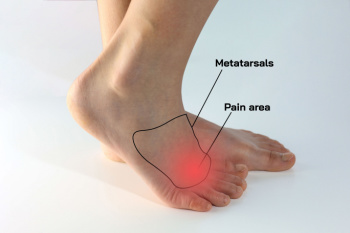
 Morton's neuroma can have a significant impact on athletes, affecting their performance and overall foot comfort. Morton’s neuroma occurs when the tissue around one of the nerves connected to the toes thickens and becomes inflamed. Symptoms of Morton’s neuroma, including pain and discomfort in the ball of the foot, can be exacerbated during activities that involve repetitive stress on the front of the foot, like running or jumping. This is why forefoot pain and Morton’s neuroma are more common in athletes who use those repetitive motions. Athletes experiencing Morton's neuroma may find their agility and endurance compromised. However, there are strategies to manage pain so athletes can continue to exercise. Choosing appropriate footwear with ample cushioning and room for the toes is crucial. Additionally, incorporating orthotic inserts can provide extra support and alleviate pressure on the affected area. Athletes should also consider modifying their training routines to include low-impact exercises and activities that reduce stress on the forefoot. If you have pain in the ball of your foot, it is suggested that you consult with a podiatrist who can locate the source of the pain and provide treatment options for conditions such as Morton’s neuroma.
Morton's neuroma can have a significant impact on athletes, affecting their performance and overall foot comfort. Morton’s neuroma occurs when the tissue around one of the nerves connected to the toes thickens and becomes inflamed. Symptoms of Morton’s neuroma, including pain and discomfort in the ball of the foot, can be exacerbated during activities that involve repetitive stress on the front of the foot, like running or jumping. This is why forefoot pain and Morton’s neuroma are more common in athletes who use those repetitive motions. Athletes experiencing Morton's neuroma may find their agility and endurance compromised. However, there are strategies to manage pain so athletes can continue to exercise. Choosing appropriate footwear with ample cushioning and room for the toes is crucial. Additionally, incorporating orthotic inserts can provide extra support and alleviate pressure on the affected area. Athletes should also consider modifying their training routines to include low-impact exercises and activities that reduce stress on the forefoot. If you have pain in the ball of your foot, it is suggested that you consult with a podiatrist who can locate the source of the pain and provide treatment options for conditions such as Morton’s neuroma.
Morton’s neuroma is a very uncomfortable condition to live with. If you think you have Morton’s neuroma, contact Dr. Nooshin Zolfaghari of VIP Foot & Ankle Center. Our doctor will attend to all of your foot care needs and answer any of your related questions.
Morton’s Neuroma
Morton's neuroma is a painful foot condition that commonly affects the areas between the second and third or third and fourth toe, although other areas of the foot are also susceptible. Morton’s neuroma is caused by an inflamed nerve in the foot that is being squeezed and aggravated by surrounding bones.
What Increases the Chances of Having Morton’s Neuroma?
Morton’s neuroma is a very treatable condition. Orthotics and shoe inserts can often be used to alleviate the pain on the forefront of the feet. In more severe cases, corticosteroids can also be prescribed. In order to figure out the best treatment for your neuroma, it’s recommended to seek the care of a podiatrist who can diagnose your condition and provide different treatment options.
If you have any questions, please feel free to contact our office located in Pembroke Pines, FL . We offer the newest diagnostic and treatment technologies for all your foot care needs.